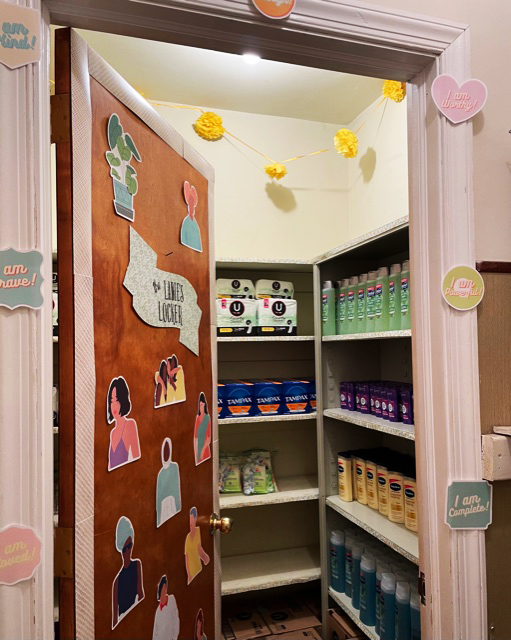
A brightly decorated “Ladies Locker” is seen at the archdiocesan Catholic Social Services (CSS) Northeast Family Service Center in Philadelphia. CSS recently launched “Take Back the Month” at its sites to provide feminine hygiene products to low-income women and girls, reducing both “period poverty” and its stigma. (Photo courtesy of Beth Wood)
A new outreach is helping to lift women and girls out of real – but largely overlooked – “period poverty.”
Archdiocesan Catholic Social Services (CSS) has launched “Take Back the Month,” an ongoing campaign that’s collecting feminine hygiene products for free distribution at several of the agency’s locations, as well as archdiocesan high schools staffed by CSS social workers.
Participants can purchase items for shipment to CSS via the online platform YouGiveGoods, or contact CSS to donate new, unopened items directly.
The initiative “all comes down to dignity,” said Amy Stoner, CSS’s director of community-based and homeless services.
Even prior to the pandemic, menstrual products (along with infant diapers) strained budgets in households at or below the poverty line. With pad or tampon changes required every few hours, feminine hygiene costs can easily add up. At current prices, and given the 40-year average length of regular menstruation cycles, a woman can spend well over $6,000 in feminine care during her lifetime.
In at least 35 states, the products are subject to tax rates ranging from almost 5% to 10% — and the items are “not covered under federal assistance programs such as SNAP and WIC,” said Amy Stoner, CSS’s director of community-based and homeless services.
Overextending the use of feminine hygiene products, particularly tampons, places women at risk for toxic shock syndrome, while negatively impacting mental and emotional health.
[hotblock]
Stoner said “Take Back the Month,” part of a growing grassroots movement, has “been on (her) heart for a long time.”
Clients at CSS’s food cupboards have increasingly requested the products, yet emergency relief efforts typically “(focus) on food and children’s meals,” she said.
Although diaper banks have now become standard at pantries, women tend to prioritize their families’ needs over their own, while resorting to items such as “paper towels and t-shirts” for feminine hygiene substitutes, said Stoner’s colleague and assistant director Kathleen Bevenour.
“As a woman, I think, ‘How sad,’” she said, noting that while “hospitals and clinics do the best they can,” consistent access to menstrual products is out of reach for too many women and girls.
“Even the public school systems have reduced funding to provide these items,” Bevenour noted.

Uwrittasee Blake, a social worker with archdiocesan Catholic Social Services, says period poverty is a reality for students she sees at SS. Neumann-Goretti Catholic High School in South Philadelphia. (Photo courtesy of Uwrittasee Blake)
For teen girls, the lack can be especially acute, said CSS social worker Uwrittasee Blake, who serves the students of SS. John Neumann and Maria Goretti Catholic High School in South Philadelphia.
“I think the impact of not having (the products) is mentally draining,” said Blake. “I’ve actually had a couple of girls come to me with legs crossed and unable to move.”
The teens can feel “like it’s a burden for the family,” she said, especially since “parents are paying for tuition and struggling” to stretch their income among competing expenses.
Girls trying to manage their periods with limited resources are at risk for “humiliation” and a decreased “sense of self worth,” Blake said.
“People are going to talk about you,” she said. “It promotes a lot of embarrassment, and becomes a cycle that can include bullying.”
Blake and her CSS colleagues have worked to counter the stigma associated with menstruation, creating spaces in which clients can obtain appropriate products in a relaxed, reassuring manner.
The presentation style in itself is part of the solution, said Blake.
“It’s not as traumatic,” she said. “One girl brought a friend with her, and I said, ‘Honey, any time you want to, come and get it.’”
Other CSS sites have set up “Ladies Lockers,” where feminine products are neatly displayed with messages of encouragement. Among the locations are Mercy Hospice, McAuley House, Women of Hope, Visitation Homes, Mercy Café, the Chester City Coffee Club and the six CSS family service centers across the five-county Philadelphia area.
“We really hope that women in particular will step up and donate to this,” said Stoner. “We want them to take back the month and become empowered.”
She also believes the effort will work to redress how basic personal care products are classified in public health policy.
“Let’s change the narrative,” she said. “They’re not luxury items; they’re essential.”
***
For more information and to donate to “Take Back the Month,” visit YouGiveGoods or contact Amy Stoner, director of community-based, housing and homelessness services for archdiocesan Catholic Social Services, at astoner@chs-adphila.org.
PREVIOUS: ‘Ministry of belonging’ connects young adults with, without intellectual disabilities
NEXT: St. Charles Seminary buys 15-acre tract at Gwynedd Mercy University


Share this story